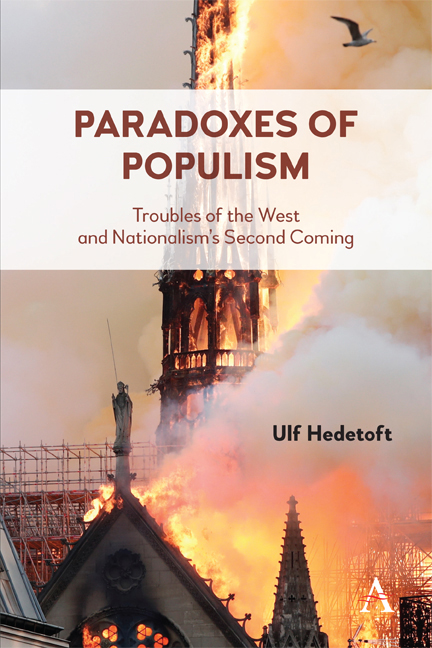Book contents
- Frontmatter
- Contents
- Acknowledgments
- 1 Introduction
- 2 What Is the Problem?
- 3 The People and Popular Sovereignty. Back to Basics, and Onward …
- 4 The Nationalization of the People
- 5 Fantasies and Paradoxes of Populism
- 6 Myths and Misconceptions
- 7 Sweden-Intransigent Moralities at War in the Peopleâs Home
- 8 Catalonia-Toward a State Truly Our Own!
- 9 Hungary-Righteous Revenge for Historic Humiliations
- 10 Brexit-Between Despair and Delusion
- 11 The United States-Normalizing a Superpower by Abnormal Means
- 12 Extractions and Perspectives
- References
- Index
5 - Fantasies and Paradoxes of Populism
Published online by Cambridge University Press: 02 April 2020
- Frontmatter
- Contents
- Acknowledgments
- 1 Introduction
- 2 What Is the Problem?
- 3 The People and Popular Sovereignty. Back to Basics, and Onward …
- 4 The Nationalization of the People
- 5 Fantasies and Paradoxes of Populism
- 6 Myths and Misconceptions
- 7 Sweden-Intransigent Moralities at War in the Peopleâs Home
- 8 Catalonia-Toward a State Truly Our Own!
- 9 Hungary-Righteous Revenge for Historic Humiliations
- 10 Brexit-Between Despair and Delusion
- 11 The United States-Normalizing a Superpower by Abnormal Means
- 12 Extractions and Perspectives
- References
- Index
Summary
This chapter is not specifically about the UK, but it is nevertheless fitting to begin with a lengthy quotation that addresses the Brexit debacle, because it reveals something fundamental about populism and its inherent paradoxes.
In a noteworthy article in The Guardian on December 2, 2018, the newspaper’s columnist, Matthew d’Ancona, makes the following astute comments on the process, which at the time anticipated the fate of Theresa May's “Brexit deal” with the EU in the British House of Commons— comments that only miss the heart of the matter by an inch.
For decades there was something close to a political consensus that the most important metric was economic prosperity. A wealthy nation was essential both to the aspirations of individual households and the funding of public services. The Tories might give greater weight to the former. […]
Brexit is both symptom and cause of a breakdown in this consensus. It can no longer be taken for granted that senior politicians, or the voters themselves, will automatically and reflexively put national wealth first.
As long ago as January 2014, Nigel Farage was explicit about this: “If you said to me, would I like to see over the next 10 years a further 5 million people come into Britain and if that happened we’d all be slightly richer, I’d say, I’d rather we weren't slightly richer.” […]
We have reached the point where, to an extraordinary extent, the implementation of the 2016 referendum result trumps all else. Why so? Because, as Farage declared with more candour than most mainstream politicians can yet muster, culture is nudging old- fashioned political economy out of its prime spot. Immigration is now the gravitational centre of the whole debate: a debate much less about national wealth or national sovereignty than national identity.
Beneath all the talk of “control” and “global Britain,” there is the germ of an extremely unpleasant nativism. Again, we pesky centrists are told to be quiet and to heed the concerns of those who have been “left behind.” But since there is not a shred of respectable evidence that immigration has had more than a marginal impact upon public service capacity, wage levels or net welfare costs, I am forced to conclude that there is now a sufficiency of Britons who just don't much like people of foreign extraction, and certainly don't want many more of them around the place. […]
- Type
- Chapter
- Information
- Paradoxes of PopulismTroubles of the West and Nationalism's Second Coming, pp. 51 - 68Publisher: Anthem PressPrint publication year: 2020



